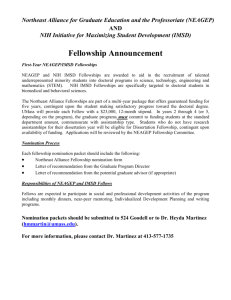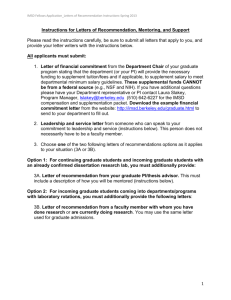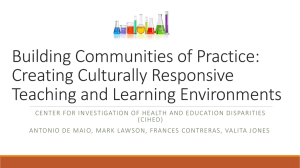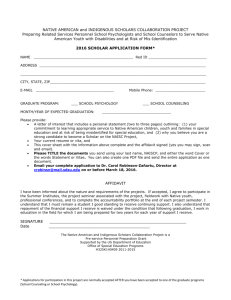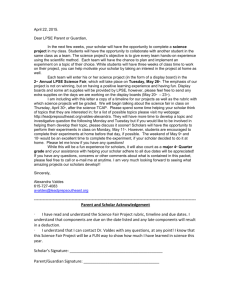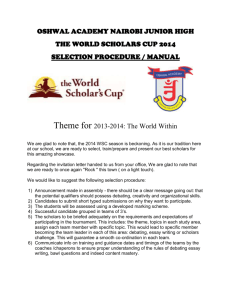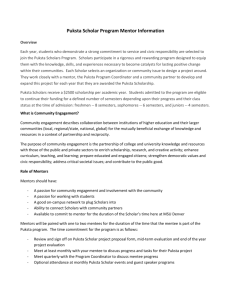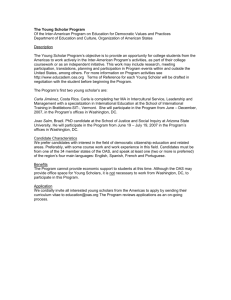Virginia Tech Post-Baccalaureate Research and Education Program
advertisement
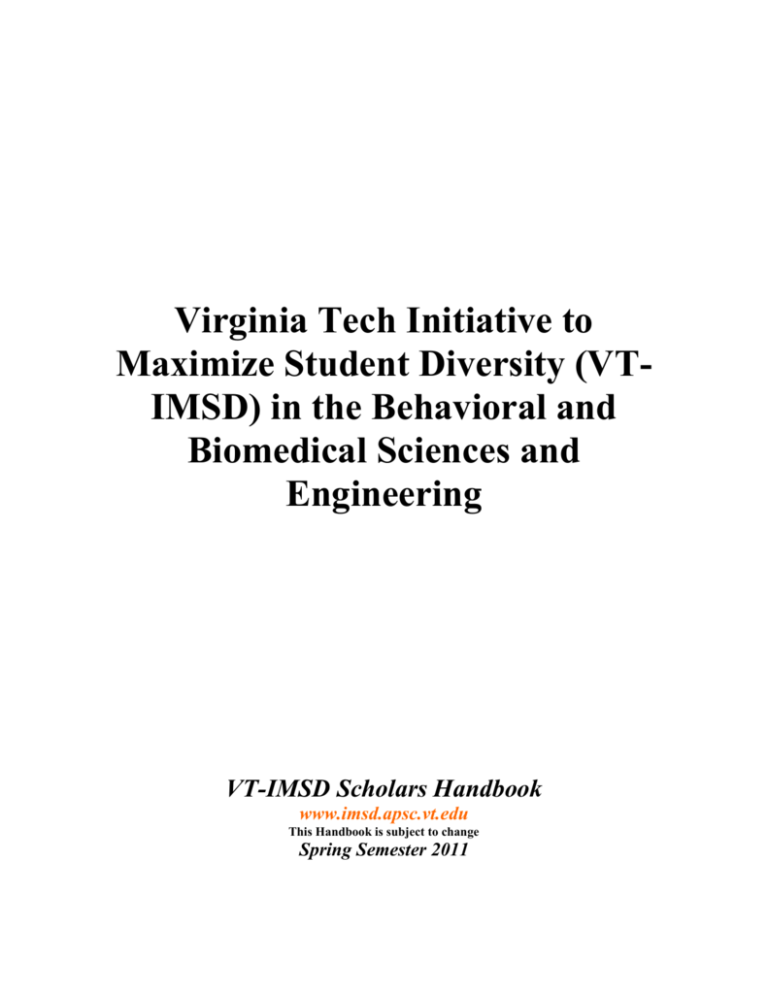
Virginia Tech Initiative to Maximize Student Diversity (VTIMSD) in the Behavioral and Biomedical Sciences and Engineering VT-IMSD Scholars Handbook www.imsd.apsc.vt.edu This Handbook is subject to change Spring Semester 2011 TABLE OF CONTENTS Mission Program Support Program Governance and Management DOCTORAL IMSD PROGRAM: Eligibility for being a Doctoral IMSD Scholar Responsibilities of Doctoral Scholars Benefits for Doctoral Scholars Terms of Appointment for Doctoral Scholars Phase I Phase II Faculty Mentors of Doctoral Scholars Peer Mentors of Doctoral Scholars Coursework Enrollment Termination from VT-IMSD Support UNDERGRADUATE IMSD PROGRAM Eligibility for being an Undergraduate IMSD Scholar Responsibilities of Undergraduate Scholars Benefits for Undergraduate Scholars Terms of Appointment for Undergraduate Scholars Phase I Phase II Faculty Mentors of Undergraduate Scholars Peer Mentors of Undergraduate Scholars Coursework Enrollment Termination from VT-IMSD Support IMSD PROGRAM REQUIREMENTS FOR BOTH DOCTORAL AND UNDERGRAD SCHOLARS Code of Conduct Problem Resolution Participation in IMSD Program Evaluations APPENDICES: Appendix 1: List of Research Area Program Coordinators Appendix 2: First Year Lab Rotation Report Appendix 3: Individual Progress Report 2 Contact Information: All area codes 540 Dr. Ed Smith, Grant PI and Program Director (PD) 2250 Litton-Reaves Hall, 231-6797 esmith@vt.edu Dr. David Bevan, Co-PI and Co-PD 201 Fralin Life Science Center, 231-5040 drbevan@vt.edu Dr. Anne McNabb, Ombudsperson 5038 Derring Hall, 231-6118 happy@vt.edu Program Manager Leemar Thorpe, Acting Program Manager lcthorpe@vt.edu IMSD/PREP Office – 2210 Litton-Reaves Hall, 231-5898 Dr. Lee Cooper and Ms. Sarah Allgood, IMSD Evaluators 3110 Prices Fork Rd., 231-7709 ldcooper@vt.edu sfallgood@hotmail.com 3 VIRGINIA TECH INITIATIVE TO MAXIMIZE STUDENT DIVERSITY (VT-IMSD) Mission To recruit and use developmental and experiential learning activities to support scholars from groups historically underrepresented in the behavioral and biomedical, sciences and engineering so they may succeed in obtaining a Ph.D. and pursuing a research career in these disciplines. Program Support The VT-IMSD is supported by the National Institutes of Health (NIH) through the National Institute of General Medical Sciences, which has a special commitment to preparing scholars from underrepresented groups for participation in careers in the biomedical and behavioral sciences. Program Governance and Management The VT-IMSD program will be led according to the terms and conditions governing NIGMS grant 5R25GM072767. As promised to NIH, the Principal Investigator, Ed Smith, who shall also be referred to in this document as the Program Director, will lead IMSD. Other members of the Management Team include the Co-PD, David Bevan; the Ombudsperson, Anne McNabb and the Program Manager. Day-to-day management of IMSD is the responsibility of the Program Director who will be assisted by the Program Manager. The Ombudsperson is available to help the scholars address concerns and resolve problems in a confidential setting. The Management Team will have the primary responsibility of facilitating the progression of IMSD scholars through an experiential program that will help them to prepare for Ph.D. admission (Undergraduate Scholars), or succeed in obtaining a Ph.D. and pursuing a research career (Graduate Scholars) in behavioral and biomedical fields of science and engineering. The Program Director will be responsible for the disbursement of IMSD funds and will make personnel decisions in consultation with the Management Team and the scholar’s faculty mentor. DOCTORAL IMSD PROGRAM: Eligibility for being a Doctoral IMSD Scholar A master’s degree, BA, or BS, obtained within the last three years, with a minimum GPA of 3.2 (out of a possible 4.0) US citizenship, non-citizen national status or permanent residency Must be from an ethnic group considered to be historically underrepresented by the Federal Government or present evidence of interest and commitment to issues related to diversity Acceptance to a PhD program at Virginia Tech Responsibilities of Doctoral Scholars The primary responsibility of the scholar is to ensure that he/she is making adequate progress in obtaining a Ph.D. in a behavioral or biomedical field in science or engineering within the requirements of the departmental or interdisciplinary degree program in which he/she is enrolled. Adequate academic progress shall be defined as but not limited to the following: 4 Becoming an independent worker capable of conceiving and carrying out a scientific research project Developing an ability to judge science within a discipline consistent with the biomedical and behavioral science culture Being able to communicate effectively research results to peers locally and at national and international meetings Doctoral scholars also: Are expected to attend and participate in biweekly forums during the academic year and other IMSD events such as professional development sessions and IMSD/PREP social activities. Are required to enroll in the Grant Writing course and a workshop or course on Bioethics and the Responsible Conduct of Research during Phase I of IMSD Are encouraged to enroll in the GTA workshop (GRAD 5004, 1 cr) offered by the Graduate School as part of the Transformative Graduate Education Initiative. This workshop, which is held during two half days prior to the beginning of fall semester classes, is required by many departmental doctoral programs and is required before a graduate student can do any teaching. Are expected to mentor, on request, IMSD undergrads or PREP scholars. Benefits for Doctoral Scholars Phase I: Benefits provided scholars are in accordance with NIH guidelines: $21,000 annual stipend as a Graduate Research Assistant during the period of IMSD support (Phase I). Tuition Scholarship provided (scholars are required to pay any fees). “Out-of-state” tuition is waived for non-VA residents during assistantship support but non-VA residents should consider establishing VA residency prior to Phase II of IMSD (see below). Travel support to attend a workshop or to make a presentation at a scientific meeting each year during Phase I. Generally, attendance and a presentation at the yearly ABRCMS meeting is required, scholars should consult with the Program Director about attendance and funding for other meetings. Use of a personal computer for the duration of time the scholar is in the degree program Phase II: During the period of departmental/program support (Phase II), the scholar may be designated as a Graduate Teaching Assistant, a Graduate Research Assistant or a Graduate Assistant, or be supported by a fellowship or scholarship if available. Graduate assistantships provide tuition scholarships and “Out-of-state” tuition waivers for non-VA residents. However, students should investigate obtaining Virginia residency early in their degrees, in case they receive a scholarship/fellowship or other types of support during Phase II; http://www.grads.vt.edu/financial/tuition_residency/instate_residency.html. During the period of departmental/program support the annual stipend must be at least equal to that during IMSD support. Terms of Appointment of Doctoral Scholars Phase I: a 24-month mentored research experiential work and educational program funded by the IMSD program. IMSD scholars are required to pursue three lab rotations during the first year, each for a minimum of three months. The first rotation is to begin at the start of the fall semester in which the student enters the program. A final decision about the other two 5 rotations is required by November 1 of the first semester. The scholar’s choice of lab rotations is made in consultation with the Program Director and the appropriate Research Area Coordinator (see Appendix 1 for a list of the Research Area Coordinators). The scholar is to submit a report of each rotation within four weeks after completion of the rotation (see Appendix 2 for the report form). Occasionally, the Program Director may waive the requirement for rotations in cases where the scholar’s department considers rotations to not be appropriate. When the scholar has decided on a Graduate Advisor (Committee Chair) and establishes a Graduate Committee, that committee needs to include an IMSD Program Director or Research Program Area Coordinator (see list in Appendix 1). Other requirements during Phase I: VT coursework that may be used toward the doctoral degree Academic seminars and workshops relevant to the scholar’s degree Regional and national conferences relevant to the scholar’s degree Meetings 1. Attendance at IMSD/PREP regular forums and special social events 2. Meetings about degree progress with the IMSD Program Director (weekly during the first semester, as needed subsequently) 3. Get acquainted meeting with the IMSD Ombudsperson to promote awareness of this service; other meetings as needed to help with scholar concerns, problems and development 4. Meetings with the Peer mentor Enrollment in the Grant Writing Class and the preparation of a grant proposal related to the scholar’s research. Presentation of a seminar in the IMSD/PREP Forum each academic year. Submission of documentation of academic progress in the program (coursework, research, papers presented, etc) in October of each academic year. Phase II: the period of degree work needed to complete PhD after the period of IMSD funding (Phase I). Scholars continue in the IMSD Program during Phase II but are funded by their degree program/department. During this time, scholars focus to a greater extent on their dissertation work and departmental/program requirements for their specific field of behavioral or biomedical work. Phase II Doctoral Scholars are expected to: Maintain regular interactions with the IMSD program by attending IMSD/PREP Forums, other IMSD offerings and IMSD social events with some regularity Serve as Peer Mentors to Undergraduate Scholars or Phase I Doctoral Scholars on request Participate in interviews with prospective scholars and help with other recruiting activities on request Faculty Mentors of Doctoral Scholars Research mentors, with outstanding records of scholarly work and student advising from different colleges and programs at Virginia Tech, have agreed to use their experiences and wisdom in mentoring IMSD scholars in behavioral and biomedical fields. The broad research areas of the faculty include: Genetics, Bioinformatics, and Computational Biology; Psychological Sciences; Molecular and Cellular Biology and Physiology; Microbial Sciences; and Biomedical Engineering. Faculty mentors from these research areas may temporarily 6 advise/supervise IMSD Doctoral Scholars during one of the rotations that scholars engage in during their first year and/or become the Graduate Advisor/Major Professor for the Scholar’s PhD degree. A faculty mentor is responsible for the day-to-day research and related activities of the IMSD scholar working under his/her supervision, in accordance with Graduate School Policies and Procedures. Each scholar is expected to actively participate in the program in the mentor’s research laboratory and to carry out a research project that offers the potential for scholar growth and development within the PhD as well as having impact on the behavioral/biomedical fields. Faculty mentors for lab rotations should engage the scholar in a project that allows the scholar to determine if he/she wishes to do doctoral research under that faculty member. Faculty mentors who become the Graduate Advisor/Committee Chairperson for a scholar’s doctoral degree are expected to guide the scholar in all degree requirements according to Graduate School Policies and Procedures and the degree requirements for the scholar’s doctoral program. The scholar’s Graduate Advisor and departmental program are responsible for the scholar’s financial support during Phase II of the program. It will be the responsibility of the faculty mentor and the scholar to identify disciplinary conferences to attend and to present research papers/posters. IMSD will provide travel support for IMSD scholars during Phase I and may provide partial travel support for presentations at meetings during Phase II, in response to a request from the Faculty Mentor, if funds are available. Faculty Mentors will be required to provide periodic feedback about scholar degree progress to the IMSD Evaluation and Management teams. Peer Mentors of Doctoral Scholars Doctoral Scholars will be matched with a mentor who is a more advanced doctoral student who is, or has been, in the IMSD or PREP programs. Peer Mentors are appointed early in fall semester of the scholar’s first year in IMSD. The mentor will help the new IMSD scholar get acclimated to life at Virginia Tech and in the Blacksburg area. Scholars will meet with their mentors at least once a month. Coursework Enrollment Doctoral IMSD scholars must be fully enrolled during the academic year for at least 12 credits of formal coursework and research per semester. Formal coursework should consist of courses that may be applied to the student’s formal Plan of Study for the degree as well as courses deemed appropriate for the individual scholar’s development during Phase I of IMSD. Initial coursework choices during the period of research rotations are made in consultation with the Research Area Coordinator and the IMSD Program Director. Following the choice of a laboratory in which the student will do their dissertation work, the Mentor/Graduate Advisor and the scholar’s Graduate Committee will play the most important role in coursework choices. Termination from VT-IMSD Support IMSD scholars are initially given a one-year contract that is renewable for a second year with documentation of adequate degree progress. The maximum Phase I appointment funded by the IMSD program is 2 years (subsequent Phase II funding is provided by the department/program in which the scholar is enrolled). 7 Voluntary Withdrawal from IMSD funding IMSD, like other educational enrichment programs, is run on a trust system and our ability to identify scholars/candidates who will stay the course and follow their career goals as espoused in their applications and during the interview process. Supporting the career goal of becoming a biomedical or behavioral scientist is our sole purpose in IMSD. Therefore, if a scholar determines that he or she wishes to change career goals and withdraw from participation in IMSD, we will focus on understanding the reasons for this decision and provide guidance as appropriate. If a scholar decides to voluntarily withdraw from the program, a 30-day notice should be given to the Faculty Mentor and the IMSD Program Director prior to resignation. Termination of IMSD funding IMSD scholars may be terminated from the IMSD Program and funding for reasons that include but are not limited to the following: Inadequate academic progress toward the Ph.D. program Activities determined to be inconsistent with graduate status as described in the Graduate Policies and Procedures Systematic failure to meet requirements of the IMSD program as described in this document and the IMSD contract. The following procedure shall be used as a guide in terminating scholars from IMSD funding during Phase I: 1. The IMSD scholar shall be informed in writing of the specific problem/violation 2. A meeting to discuss the situation shall be arranged, if necessary, of the IMSD scholar, the Ombudsperson, the Program Director, and in some cases, the Faculty Mentor. If the Faculty Mentor has become the scholar’s Graduate Advisor (as codified by filing of a Plan of Study for the degree), the Mentor/Graduate Advisor must be involved in evaluations of academic progress. 3. A final decision about the termination of IMSD funding shall be made by the Management Team, all of who do not have to meet with the scholar prior to making a final decision. Termination from the IMSD Program and IMSD funding shall be made in writing and scholars will be given a 30-day notice prior to termination of funding. It should be noted that a graduate student can only be dismissed from his/her doctoral degree program by action of the Advisor, the Student’s Graduate Committee and the departmental program, in accordance with Graduate School Policies and Procedures. UNDERGRADUATE IMSD PROGRAM Eligibility for being an Undergraduate IMSD Scholar Enrollment in a bachelor’s degree program at Virginia Tech. Cumulative GPA progress indicating the scholar can do research and establish an academic record that will be competitive for doctoral degree admission by the end of the bachelor’s degree. Scholars should note that graduate admission typically requires a GPA above 3.0/4.0 and to be competitive for good graduate programs, with funding, typically requires GPAs of 3.5 or higher. US citizenship, non-citizen national status or permanent residency 8 Must be from an ethnic group considered to be historically underrepresented by the Federal Government or demonstrate interest and commitment to issues related to diversity. A faculty member willing to mentor the scholar in a behavioral or biomedical research project for the remainder of the time the scholar is completing his/her bachelor’s degree must be identified. Responsibilities of Undergraduate Scholars The primary responsibility of the scholar is to ensure that he/she is making adequate progress in his/her undergraduate research project in a behavioral or biomedical field in science or engineering in addition to meeting the requirements of the bachelor’s degree program in which he/she is enrolled. Each scholar is expected to actively participate in research that offers the potential for scholar growth and development that prepares the scholar for entering a doctoral degree in behavioral or biomedical fields following the bachelor’s degree. Adequate progress shall be defined as but not limited to the following: Become an independent worker capable of conceiving and carrying out scientific research. Develop an ability to judge science beyond the student’s own immediate research field. Be able to communicate effectively research results to peers locally and at national meetings. Undergraduate scholars are expected to attend and participate in biweekly IMSD/PREP Forums, weekly undergraduate IMSD meetings during the academic year and other IMSD enrichment sessions such as professional development seminars and IMSD/PREP social activities. Undergraduate scholars are expected to identify and apply for summer research opportunities at other universities and attend at least one such program to broaden the scope of their research experiences. Benefits for Undergraduate Scholars Benefits provided scholars are in accordance with NIH guidelines: Hourly wage support (12 hours/week) from IMSD during two academic years. Travel support to attend a workshop and/or to make a presentation at ABRCMS, yearly. Terms of Appointment for Undergraduate Scholars Phase I: up to 24 months of mentored research experiential work funded by the IMSD program Each scholar will be involved in his/her undergraduate research project throughout the academic year in addition to coursework required for the bachelor’s degree Scholars are expected to attend and present posters at ABRCMS yearly Submission of a report about research progress, to the Program Directors, each semester Other responsibilities o Attend and participate in PREP & IMSD regular forums, weekly undergrad IMSD scholar meetings and special social events. o Meet about degree progress with the IMSD Program Director. o Get acquainted meeting with the IMSD Ombudsperson to promote awareness of the Ombudsperson’s availability to aid scholars with issues or problems. 9 o Attend other meetings as needed to support scholar concerns and development. o Meet with the Peer mentor. Phase II: period of support by the scholar’s Faculty Mentor. Research responsibilities are determined by the mentor. Responsibilities for attending meetings remain as in Phase I. Faculty Mentors of Undergraduate Scholars Research mentors, with outstanding records of scholarly work and student advising from different colleges and programs at Virginia Tech, have agreed to use their experiences and wisdom in mentoring IMSD Undergraduate Scholars. The broad research areas of the faculty include: Genetics, Bioinformatics, and Computational Biology; Psychological Sciences; Molecular and Cellular Biology and Physiology; Microbial Sciences; and Biomedical Engineering. An undergraduate IMSD scholar is expected to work with the same Faculty Mentor from the time of appointment as a scholar until completion of the bachelor’s degree. The Faculty Mentor is responsible for supervision of the day-to-day research and related activities of the IMSD scholar. As indicated above, each scholar is expected to actively participate in the program in the mentor’s research laboratory and to carry out a research project that offers the potential for scholar growth and development that prepares the scholar for entering a doctoral degree in behavioral or biomedical fields following the bachelor’s degree. Scholars are expected to attend and present posters at ABRCMS yearly and Faculty Mentors may request IMSD travel support for the scholar to attend other appropriate meetings. Mentors also are required to provide periodic feedback about the Scholar’s research and degree progress as detailed in the section on Evaluation below. Peer Mentors of Undergraduate Scholars Undergraduate scholars are mentored, as a group, by a doctoral student who is in Phase II of the IMSD Doctoral Program. Current practice is for the mentor to meet with the undergrad scholars weekly during each academic year semester. Coursework Enrollment Undergraduate scholars must be full time students enrolled in bachelor’s degrees. They enroll in Undergraduate Research as well as the coursework requirements for their degree. Termination from VT-IMSD Support Undergraduate scholars are initially given a one-year contract that is renewable for a second year with documentation of adequate research progress. The maximum Phase I appointment funded by the IMSD program is 2 years (subsequent Phase II funding is provided by the scholar’s faculty mentor). Voluntary Withdrawal from IMSD funding IMSD, like other educational enrichment programs, is run on a trust system and our ability to identify scholars/candidates who will stay the course and follow their career goals as espoused in their applications and during the interview process. Supporting the career goal of becoming a biomedical or behavioral scientist is our sole purpose in IMSD. Therefore, if a scholar 10 determines that he or she wishes to change career goals and withdraw from participation in IMSD, we will focus on understanding the reasons for this decision and provide guidance as appropriate. If a scholar decides to voluntarily withdraw from the program, a 30-day notice should be given to the mentor and the IMSD Program Director prior to resignation. Termination of IMSD funding IMSD scholars may be terminated for reasons that include but are not limited to the following: Inadequate research performance based on expectations set by the scholar’s faculty mentor. Activities determined to be inconsistent with Student Life Policies of Virginia Tech as outlined in the Student Handbook; http://www.hokiehandbook.vt.edu/. Systematic failure to meet requirements of the IMSD program as described in this document and the IMSD contract. The following procedure shall be used as a guide in terminating scholars from IMSD funding: The IMSD scholar shall be informed in writing of the specific violation. A meeting with the undergraduate scholar to discuss the situation shall be arranged, if necessary, and may include the Ombudsperson, the Program Director, and the Faculty Mentor. A final decision about termination will be made by the Management Team after consultation with the Faculty Mentor. Termination shall be made in writing and the scholar will be given a 30-day notice prior to termination. IMSD PROGRAM REQUIREMENTS FOR BOTH DOCTORAL AND UNDERGRAD SCHOLARS Code of Conduct VT-IMSD scholars are expected to conduct themselves in a professional manner at all times. The Expectations for Graduate Education at Virginia Tech can be found online at http://www.grads.vt.edu/academics/expectations/expectations.html and the Hokie Handbook for undergraduates can be found at http://www.hokiehandbook.vt.edu/ Problem Resolution Built into IMSD management and activities are a series of opportunities to address problems that scholars may encounter. IMSD scholars are expected to use resources available to them in solving problems including: 1. The scholar’s Faculty Mentor, who in the case of Graduate Scholars, is the Graduate Advisor/Chair of the scholar’s Graduate Committee 2. IMSD Program Director, Ed Smith or Co-Program Director, David Bevan 3. The IMSD Ombudsperson, Anne McNabb 4. The peer mentor 5. The Graduate School Ombudsperson (for doctoral scholars) 6. The departmental Undergraduate Advising Office (for undergrad scholars) 7. The IMSD Advisory Committee, for issues related to policy. IMSD EVALUATIONS 11 Program Evaluation: Graduate and Undergraduate IMSD scholars and their Faculty Mentors are required to participate in the program evaluation process which is conducted separately from the experiential activities using an anonymous electronic survey tool and interviews conducted by the IMSD Evaluators, Dr. Lee Cooper and Ms. Sarah Allgood. Individual Progress: Each scholar is required to fill out an individualized form, during October, for each year the scholar is in the program. A copy of the form is included in Appendix 3. These forms supply information required for the annual progress report to NIH. Evaluation of Understanding of Research Framework and Scientific Writing: In Phase I of the doctoral IMSD program, scholars take the IMSD Grant Writing course during which they develop a grant proposal related to their research. The PD, who teaches this course, works with the students during the semester and evaluates their grant proposals at the end of the semester. Undergrad Scholars prepare a research proposal for IMSD during their first year in the program, and submit this proposal to the PD. APPENDICES Appendix 1. List of Research Area Coordinators Genetics, Bioinformatics and Computational Biology: David Bevan, Assoc. Prof. Biochemistry; Co-PD of IMSD Reinhard Laubenbacher, Prof. VBI & Mathematics, Deputy Director of Educ., VBI Psychological Sciences: Bob Stephens, Prof. & Head Psychology Tom Ollendick, Prof. Psychology, Univ. Distinguished Prof. Molecular and Cellular Biology and Physiology Eric Wong, Prof. Anim. & Poult. Sci. Brenda Winkel, Prof. & Head Biological Sciences Microbial Sciences: Roger Avery, Prof. & Assoc Dean, College of Veterinary Medicine X. J. Meng, Prof. Biomed. Sci., Veterinary Medicine Biomedical Engineering: Clay Gabler, Assoc. Prof. BME; Asst. Director, VT-Wake Forest, School of Biomed Eng Ishwar Puri, Prof. & Head, Engin. Sci. & Mechanics 12 Appendix 2: VT Initiative to Maximize Student Development (IMSD) First Year Lab Rotation Report* Scholar: ______________________ Lab: _________________________ Dates (period of rotation): _____________________________ Rotation: First Second Third Project title: ______________________________________________________ ________________________________________________________________ Project objective(s): ________________________________________________ ______________________________________________________________________ ______________________________________________________________________ ____________________________________________________ Summary of results and accomplishments (use additional pages if necessary): ______________________________________________________________________ ______________________________________________________________________ ______________________________________________________________________ ______________________________________________________________________ ______________________________________________________________________ ______________________________________________________________________ ____________________________ Plans for future collaboration and/or continuity (with this lab): ________________ ______________________________________________________________________ __________________________________________________________ Submission date: ___________________________ *To be submitted to later than 4 weeks after completion of rotations. 13 Appendix 3: Individual Progress Report VT-IMSD: INDIVIDUALIZED RESEARCH AND EDUCATION PROGRAM PLAN* YEAR 2 SCHOLAR: _________________________DEPT. ___________________ DATE STARTED IN IMSD: ____________ APPROVED: IMSD DIRECTOR: ________________ DATE: _________ MENTOR: _______________________ DATE: _________ COURSES TAKEN IN YEAR 1: Term Dept. Abbr. Crd Hrs Course Title Final Grade _______ _________ ______ __________________________________ __________ _______ _________ ______ __________________________________ __________ _______ _________ ______ __________________________________ __________ _______ _________ ______ __________________________________ __________ _______ _________ ______ __________________________________ __________ _______ _________ ______ __________________________________ __________ _______ _________ ______ __________________________________ __________ _______ _________ ______ __________________________________ __________ _______ _________ ______ __________________________________ __________ _______ _________ ______ __________________________________ __________ _______ _________ ______ __________________________________ __________ _______ _________ ______ __________________________________ __________ COURSES PLANNED FOR YEAR 2: Planned Term Dept. Abbr. Course # Crd Hrs Course Title ____________ _________ ________ ______ ___________________________________ ____________ _________ ________ ______ ___________________________________ ____________ _________ ________ ______ ___________________________________ ____________ _________ ________ ______ ___________________________________ ____________ _________ ________ ______ ___________________________________ ____________ _________ ________ ______ ___________________________________ ____________ _________ ________ ______ ___________________________________ ____________ _________ ________ ______ ___________________________________ ____________ _________ ________ ______ ___________________________________ 14 ____________ _________ ________ ______ ___________________________________ ____________ _________ ________ ______ ___________________________________ *This form must be completed before Oct 15 CONFERENCES/WORKSHOPS (at least TWO including ABRCMS) TO PRESENT AT: Name of conference Date Place (Institution, City, State) ___________________________ _________ _____________________________________ ___________________________ _________ _____________________________________ ___________________________ _________ _____________________________________ RESEARCH PLAN (update-progress report): _______________________________________________________________________________ _______________________________________________________________________________ _______________________________________________________________________________ _______________________________________________________________________________ _______________________________________________________________________________ F31 PROPOSAL SUBMISSION PLAN: Do you intend to submit: ____Yes ____No When, if Yes: _____________ Why, if No: _____________________________________________________________________ COMMITTEE MEMBERS (Include IMSD representative): _________________________, _____________________________, _________________________, _________________________, _____________________________, _________________________. 2009 Committee Meeting Date: ___________________________ 2010 Committee Meeting Date: ___________________________ TIME OF PRELIM/QUALIFICATION EXAM: ___________________________ 15
